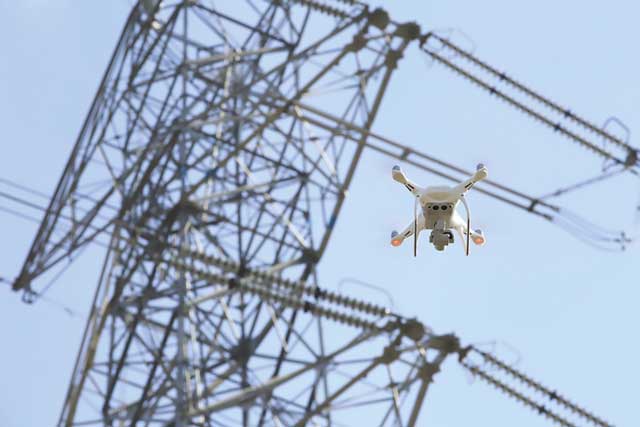
David Fowler MIStructE, Editor
david@maintenanceandengineering.com
@MaintOnLine
Two stories in this issue are particularly remarkable from the viewpoint of the changes being brought about in industry through the application of new technology. The first is about drones.
If you’re like me you might not immediately have thought of drones as an Industry 4.0 technology. I tended to see this latest technological revolution – data analytics, sensors, artificial intelligence, robotics – in narrower “smart factory” terms.
But of course drones embody a number of these things. They’re robots that happen to fly, and for people whose job it is to maintain assets, they have great potential for data collection. Fitted with cameras and suitable sensors drones are taking on a formidably important role with great implications for health and safety.
They make it easier to inspect and monitor assets in inaccessible or potentially hazardous locations – from examining wind turbines to calculating the size of a power station’s coal stocks (as described on page 8).
In such roles they remove the need for humans to be exposed to hazards such as working at heights or in harsh weather conditions – but also, for example, in areas where there’s a risk of explosion. Meanwhile a human engineer can observe the results on a computer screen from a safe location in real time.
And, as PwC’s drones programme lead Jenny Frances explains in her article, it’s not a case of technology putting people who do inspections out of work. It’s more that technology is taking over the unwelcome aspects of inspection, while at the same time a whole economy and supply chain is growing up around drone-based services.
As we’ve said before, the history of new technology is that overall it adds to rather than reduces employment.
The article points out that, as with any new development, businesses need to think carefully and develop a strategy for integrating drones into their operations before taking the plunge – as with other Industry 4.0 technology, it’s not enough to collect loads of data and store it in the cloud: think about what data will be useful to collect and what you will use it for.
In another sphere, we also report in this issue on how a range of technology is being brought together by the Iliad autonomous fork lift project. Led by the Sweden’s Örebro University, this four-year European research project also involves the University of Lincoln, which is undertaking prototype testing at its National Centre for Food Manufacturing.
With two years still to run, researchers have already been able to demonstrate the ability of a prototype to orient itself in new surroundings, without the laborious calibration process needed for existing automatic guided vehicles. The ability to detect and track human workers with whom they will share the space has also been demonstrated. By the end of the project, the fork lifts will be connected to a warehouse management system which will assign them tasks. They will be able to pick items on a list from where they are stored, and then load them on to pallets to fulfil an order, planning and coordinating their routes round the warehouse in real time.
It’s just another remarkable indication of how technology is transforming industry and freeing human workers from the more mundane tasks.
Recognition where it’s due
How much is the innovative use of technology such as the examples above really recognised?
Outside industry most people still have a decidedly low-tech view of what maintenance means. We want to change that, and that’s why we’re launching the M&E Excellence Awards. The awards are intended to celebrate innovative technology and the forward-thinking teams who put it to practical use in industry. Their achievements deserve proper recognition, and that’s what the awards are all about. Details of the categories and how to enter appear on page 6. What’s going on in your business that deserves to be more widely appreciated? Let us know. We need the help of you, our readers in industry, to make these awards a success.

